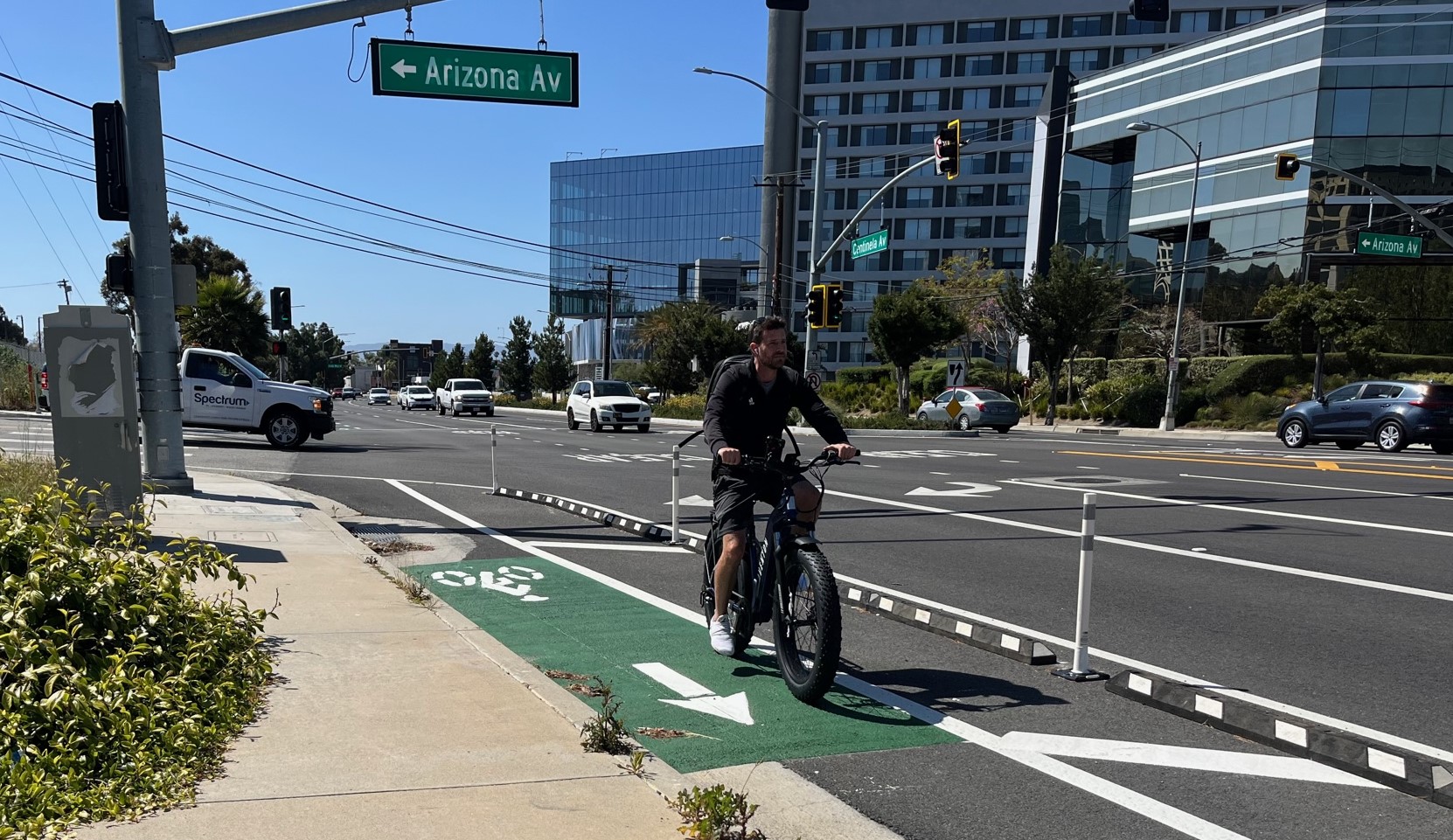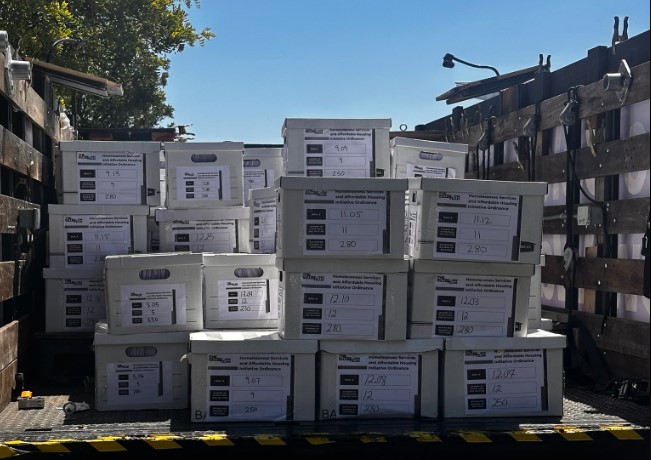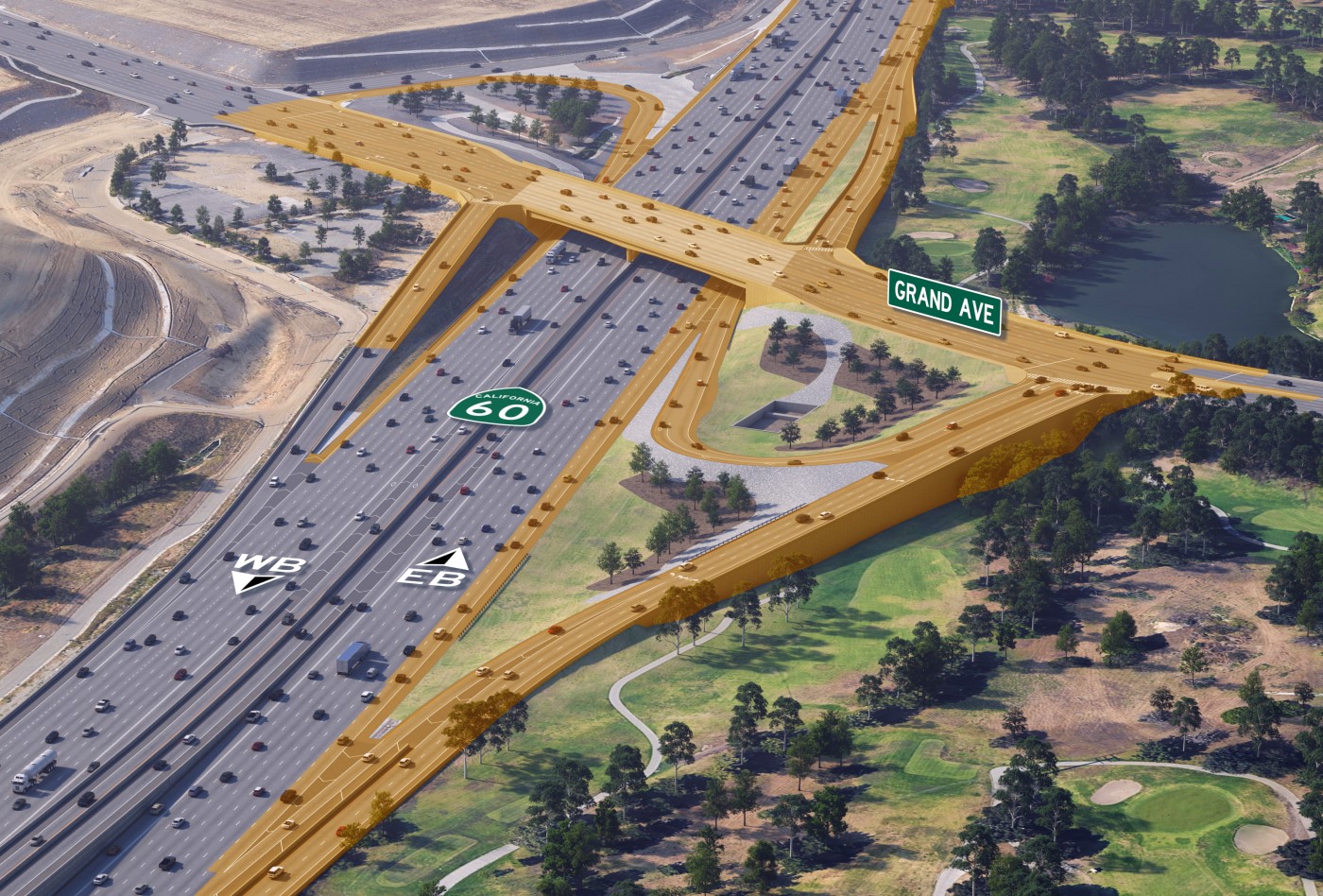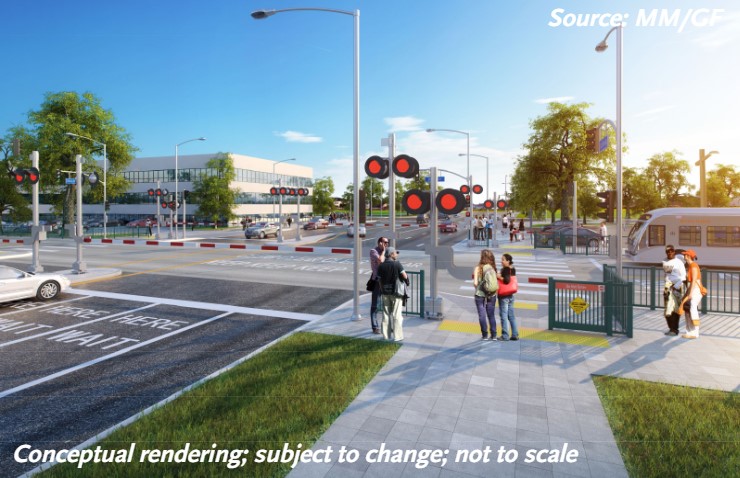We know there are 59,000 homeless people in L.A. County, most of whom are probably low- or extremely-low income. When you consider the number of people that have subsidized housing that are not homeless – they are moving, are staying with relatives, etc – those people are probably numbered a lot higher. On any given day, there are 300 units [of permanent supportive housing] on the market. (Note: the number of homeless rose in the most recent homeless count, done months after this interview, to 66,433.)
Thousands Housed in Project Roomkey in Los Angeles, but NIMBYism, Lack of Permanent Affordable Housing Blunt Progress
11:00 AM PDT on June 19, 2020
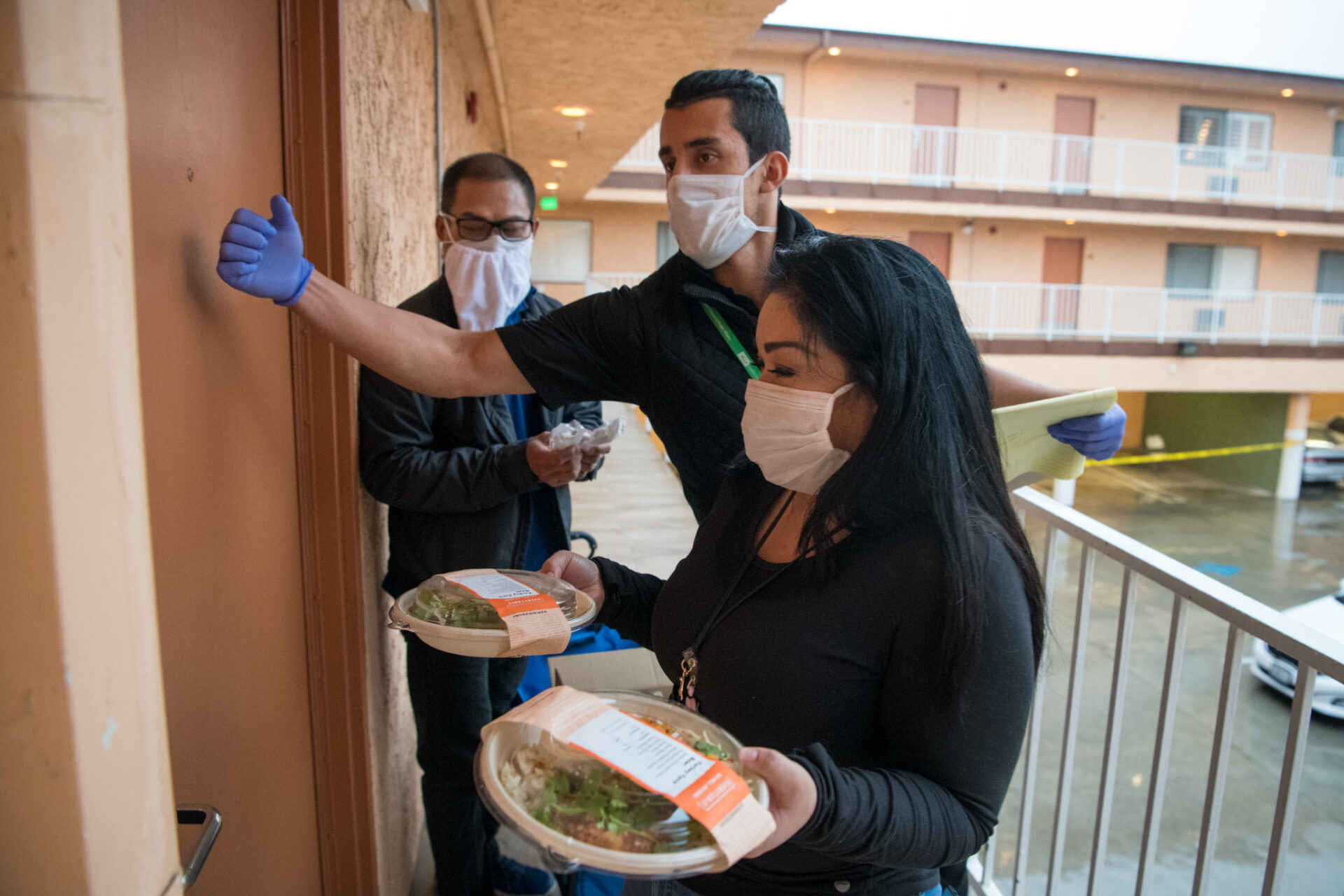
Meal delivery is one service of Project Roomkey. Photo: LAHSA
In April, Governor Gavin Newsom announced "Project Roomkey," a program that would temporarily house unhoused individuals in hotel rooms during the COVID-19 crisis. The goal was to provide shelter to 15,000 people for up to a ninety-day period. Not to be outdone, Los Angeles County announced its own goal to house 15,000 people just in Los Angeles County through Project Roomkey.
Statewide, California was closing in on its goal with over 9,400 people housed at the start of June. Locally, L.A. County hasn't had the same success, although officials with LAHSA, the county's homeless authority, still tout the program's successes.
"There should be no doubt about the significant positive impact that has been made through Project Roomkey," writes Ahmad Chapman, a spokesperson with LAHSA. "Our system has brought inside thousands of those who are at the highest risk of serious complications due to COVID-19 in just a few months. Project Roomkey is a testament to the kind of success that we can have when we have the resources that we need to effectively address homelessness."
As of June 17, the county has partnered with 34 hotels and is serving over 3,600 tenants, which is a far cry from the county's goals but still represents an improvement from the status quo. Following a very slow start in April, there were a flurry of news articles reporting on the successes and setbacks of the program in L.A. County in May. The articles focused on the problems that city and county bureaucracy had reacting quickly to the new program and singled out political leaders, especially L.A. Mayor Eric Garcetti, for not being more hands on.
But one of the main reasons that the program has struggled to reach its aspirational goal of 15,000 tenants is an old enemy of progress.
NIMBYism.
"The backlash can get pretty extreme," says Shawn Morrissey, the director of advocacy and community engagement with Union Station Homeless Services. While Union Station Housing is partnering with a pair of hotels in Monterey Park for Project Roomkey, not every city in the San Gabriel Valley has been as accommodating.
In mid-April, the county announced a partnership with Vanllee Hotel and Suites in Covina. Many housed Covina residents were not pleased. Over 100 people protested outside of the hotel in mid-April claiming that the hotel's participation in the program would endanger existing housed neighbors. Days later, two residents were arrested for possession of drugs at the hotel and the Project Roomkey proposal was put on hold. A couple of days later, it was cancelled.
This result is bad for both the 200 potential tenants that would have been housed and for the surrounding community. For housed residents of Covina, Project Roomkey could have meant 200 less unhoused residents on their streets. And for the existing unhoused residents, they lost the chance to be tenants in a program that provides not just shelter (and food), but also on-site access social workers, legal advice, mental health and addiction counselors. Project Roomkey also partners with the DMV to help tenants get identification if they need it. A recent study by LAHSA found that roughly half of applicants for permanent housing vouchers are rejected because they lack proper identification.
"There's an incentive to house people locally to where they've been living," explains Teresa Eilers with the Everyone In campaign. "This allows them to maintain relationships they have with housing navigators and care coordinators."
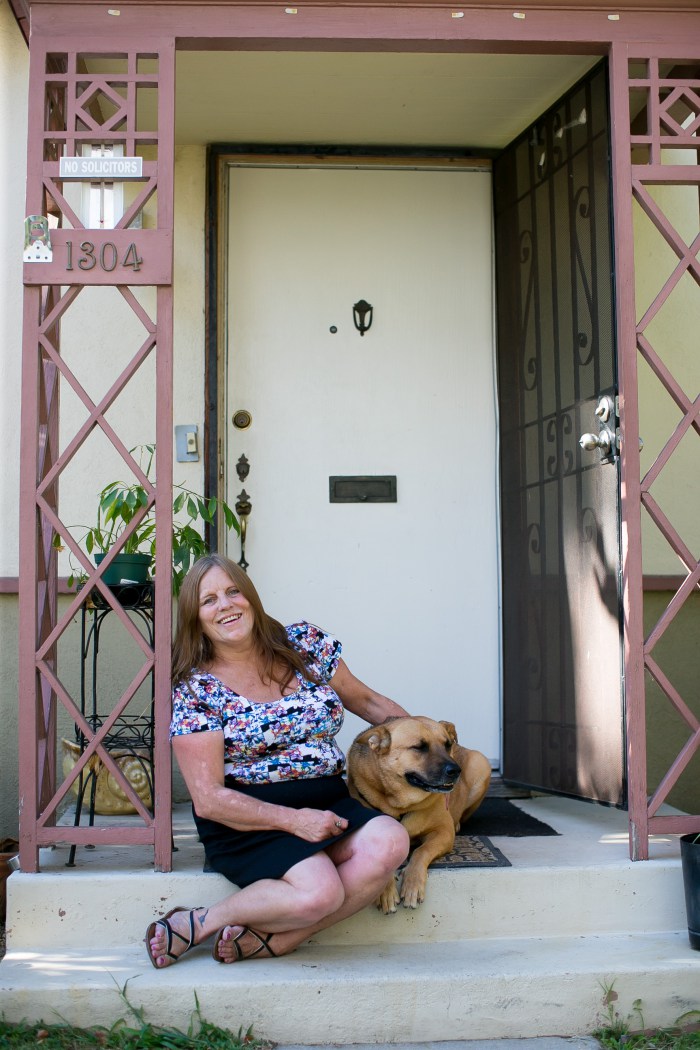
Dorothy Edwards is a believer in the power of Project Roomkey. In 2011, she was addicted to drugs living under the 210 freeway with her dog, Gunner was offered a placement through a similar hotel voucher program. In just 30 days, she moved from the hotel into permanent housing and has become one of the region's activists for people experiencing homelessness as a board member for the Corporation for Supportive Housing.
While Edwards gives credit to a lot of people who believed she could change her life, including Morrissey who intervened when her new landlord threatened to evict her and provided positive motivation when she needed it, she sees the month in the hotel voucher program as critical to her success.
"It was such a relief to have a roof over my head instead of a freeway," Edwards says. "It also helped me make more meetings... just having a place for my dog to be while I was doing the things I needed to do to be housed was a huge relief."
In addition, she was able to begin work in programs to combat the drug addiction that had taken so much from her and to begin mental health treatment. When she left the hotel voucher system, she moved into permanent supportive housing where she was able to continue these programs and rebuild her life.
With more funding than the local voucher program that helped Edwards, Project Roomkey is able to provide more on-site services for tenants in the program. Instead of traveling to meetings, social workers and therapists visit tenants in their rooms, and meals are provided on-site.
And yes, pets, such as Gunner, are invited into the rooms as well.
However, Project Roomkey tenants also face an obstacle that wasn't as prevalent in 2011 as it is today. There just isn't as much affordable and subsidized housing on the market as there was a decade ago. And with Project Roomkey bringing over 10,000 people across the state into temporary housing, the demand for permanent affordable, supportive and subsidized housing is even greater.
Dr. Laura Duncan, the director of Ascencia in Glendale, explained enormity of the affordable housing crisis in Los Angeles County in an interview with Streetsblog last year:
Meanwhile, the clock is ticking for tenants in Project Roomkey that took advantage of 90-day vouchers back in April. And, putting it charitably, the COVID-19 has not passed us by. If a tenant were magically housed in Project Roomkey the day it was announced, today would be their 70th housed day, meaning they had less than three weeks until the voucher expires.
"The big question now is what happens on the 91st day," says Eilers.
And with just days until the initial authorization (and funding) for Project Roomkey expires, nobody can answer that question, although there is movement on several fronts.
While Newsom could just extend the initial order, how an extension of Roomkey would be funded is uncertain. With the President and federal government seemingly in full retreat on efforts to combat COVID-19 and pushing "re-open" rhetoric, more FEMA funds don't seem to be on the horizon.
Newsom is working to bring funding online to purchase vacant hotels to extend Project Roomkey indefinitely. Language inserted into his budget bill seeks to limit communities such as Covina's ability to block such repurposing, e.g. "[these conversions] shall not be subject to a conditional use permit, discretionary permit, or to any other discretionary reviews or approvals.”
Newsom's budget includes $600 million for counties to purchase these hotels. While the state could offer funding to help counties continue Roomkey for current and future tenants, counties may not be able to afford the same level of on-site service.
However, a budget passed by both houses of the legislature includes only $350 million in total aide for counties to combat homelessness and does not include any language exempting hotel conversions from local permitting. It is unlikely the governor will sign this budget, but these two items of contention will likely be part of a lengthy negotiation. If a budget is not passed by July 1, then no funds will be distributed to the counties until a budget is passed.
Locally, both the City and County of Los Angeles announced a deal earlier today that would create 6,700 new temporary housing beds in the next year. It should be noted, however, that those beds are aimed at reducing and ending the homeless encampments under freeway overpasses. and that many of those beds will not yet be available when Roomkey ends in July.
For now, the project continues and LAHSA says it's doing the best it can to prepare Roomkey tenants for permanent housing when it becomes available.
"This program has presented us with a unique opportunity. Once we get folks inside, we instantly start to work with them to figure out a plan for the future that includes housing navigation and case management," Chapman says. "We also presented an outline of our plan to house those already in Project Roomkey and to continue the work of bringing inside the 15,000 individuals most at risk of serious complications due to COVID-19. Our plan will use similar strategies to our Housing Central Command program to identify units and match them with Project Roomkey participants."
Streetsblog L.A.'s coverage of the San Gabriel Valley is supported by Foothill Transit, offering car-free travel throughout the San Gabriel Valley with connections to the new Gold Line Stations across the Foothills and Commuter Express lines traveling into the heart of downtown L.A. To plan your trip, visit Foothill Transit. “Foothill Transit. Going Good Places.”
Sign-up for our SGV Connect Newsletter, coming to your inbox every Friday:
Stay in touch
Sign up for our free newsletter
More from Streetsblog Los Angeles
Eyes on the Street: Recent Centinela Bike Lanes in Culver City
The new partially-protected Centinela facility is a welcome safety upgrade for a stretch that long lacked any type of bikeway, but the area remains not all that bike-friendly
This Week In Livable Streets
Bike Month continues, Metro 91 Freeway widening, Destination Crenshaw, Culver City Bus, Santa Monica MANGo, Metro bike lockers, Metro Sepulveda Transit, and more
San Fernando Valley Bus/Bike Updates: G Line, Roscoe Bus Lanes, Laurel Canyon Bike Lanes
Short newly protected bike lane on Laurel Canyon Blvd, extensive NSFV bus improvements under construction this month, and scaled-back G Line plans should get that project under construction this summer
